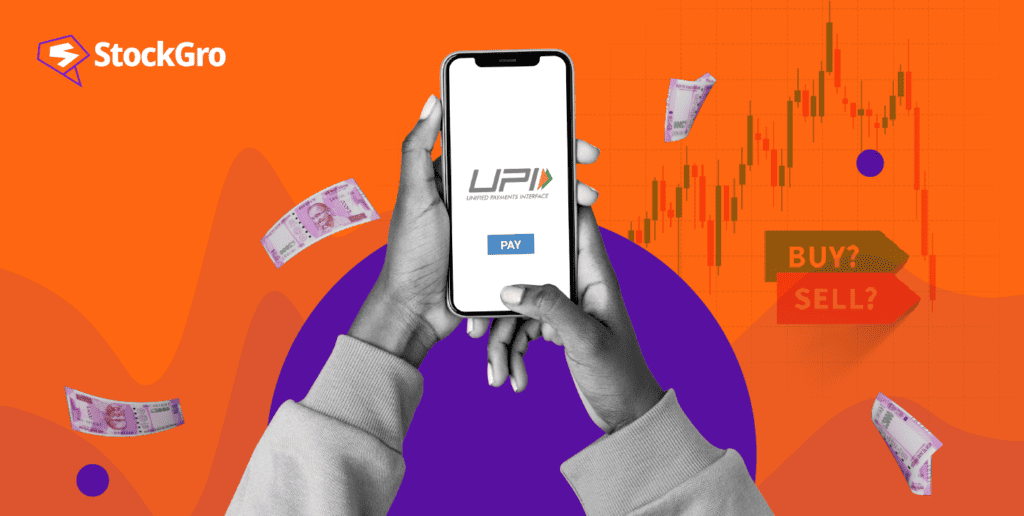
Since its launch in 2016 by the National Payments Corporation of India (NPCI), the Unified Payments Interface (UPI) has transformed how India makes payments. With over 11,410 million transactions in fiscal 2023, UPI’s popularity reflects its quickness, safety, and efficiency. Now, in the NPCI news UPI is stepping into the stock market.
| Service | Aug (in million) | Sep (in million) | Oct (in million) |
| UPI | 10,580 | 10,560 | 11,410 |
| IMPS | 489 | 473 | 493 |
| Fastag | 308 | 299 | 320 |
| Aadhaar-enabled payment system | 107 | 101 | 100 |
It means that you can now buy stocks directly using UPI without a separate brokerage account from Jan 1, 2024. This move, approved by the Securities and Exchange Board of India (SEBI) and rooted in the Reserve Bank of India’s (RBI’s) innovative single-block-and-multiple-debit facility, marks a significant leap towards making investing in stocks as simple as sending money to a friend. If you are curious about how UPI payment in the secondary market works and what it means for you, keep reading.
The traditional stock investment process
Investing in stocks the traditional way involves a few steps. Let’s break it down using an example with a fictional company, XYZ.
First off, suppose you want to buy shares in XYZ Company, where each share is priced at ₹1,500, and you want to buy five shares. That means you’ll need ₹7,500 to invest.
Next, you have to transfer this ₹7,500 into your brokerage account. This account could be with any of the brokerage platforms.
Once your funds are deposited in the brokerage account, you can place your order for the shares. If your order goes through and you buy the shares, the ₹7,500 will be taken from your account. If the order doesn’t get filled, your money stays in the brokerage account
To know more: Your comprehensive guide to successful share market investing
The game-changing shift: UPI payment in secondary market
The integration of UPI in share market investments represents a major shift from traditional methods.
This new system introduces an ASBA-like facility where investors can block funds in their bank accounts. ASBA (Application Supported by Blocked Amount) is a process developed by the SEBI for applying to IPOs, where the application money remains in the applicant’s bank account and is only debited when shares are allotted.
Continuing with our XYZ Company example, where you’re looking to buy 5 shares at ₹1,500 each, the total investment is ₹7,500. In this UPI-based method, rather than transferring the amount to a brokerage account, your bank ‘blocks’ ₹7,500 in your account. This means the money is reserved for your stock purchase but remains in your bank account.
If the purchase of XYZ shares goes through, the ₹7,500 gets debited from your account. If not, the amount is unblocked, giving you the freedom to use it elsewhere. This method is not only efficient but also adds a layer of security, as your funds stay under your control until the transaction is confirmed.
During the pilot phase of this initiative, investors have the option to block funds in their bank accounts. These funds will be debited by the Clearing Corporations only after the confirmation of the trade at the time of settlement. Moreover, Clearing Corporations are set to process direct payouts to clients on a T+1 basis, enhancing the efficiency of transactions.
Major banks and UPI apps on board
Leading this beta launch is Groww, working with important UPI apps including YES PAY NEXT and BHIM. Customers of HDFC Bank and ICICI Bank are the first to have access to this facility; sponsor banks for the clearing company and exchanges include HSBC, Yes Bank, ICICI and HDFC Bank.
Looking ahead, other major participants, including various stockbrokers like Zerodha and banks such as Axis Bank and Yes Bank, are preparing to join. Along with other UPI-enabled applications like Paytm and PhonePe, they are now undergoing certification and should soon be included in the beta launch.
You may also like: The rise of BharatPe: India’s leading fintech company
Advantages of UPI in stock market transaction
The integration of UPI payment in the secondary market is a significant leap forward, offering multiple advantages.
Streamlined investment process:
The procedure of investing in stocks has been made much simpler with the implementation of UPI. By removing the need to transfer funds into a brokerage account for each transaction, it saves time and hassle. This direct approach facilitates quicker transactions, making the investment process more efficient. As a result, it’s easier for investors, especially beginners, to participate in the stock market, potentially increasing market activity and liquidity.
Increased security and control over funds:
UPI offers enhanced security by reducing the involvement of intermediaries. Unlike the traditional method, where your funds pass through brokerage firms, UPI allows for direct transactions from your bank account. This minimises the risk of mismanagement and ensures that your money is only used for intended stock purchases. Moreover, with UPI, investors have better control over their funds, as the money is debited only when the trade is confirmed.
Reduced operational risks and intermediary earnings:
UPI’s direct transaction method minimises operational risks associated with brokerage handling. It addresses the issue of brokers potentially misusing idle funds in customer accounts known as ‘float income’. This not only makes the trading process more secure but also ensures that investors’ funds are not unnecessarily tied up or put at risk, fostering a more transparent and trustworthy trading environment.
Also read: Risk management in stock market
Bottomline
The integration of UPI in the share market is more than just a new feature. This shift indicates a broader trend of fintech innovation, where traditional financial processes are being reimagined for greater efficiency and accessibility.
One aspect still to be clarified is the handling of brokerage and other related taxes directly from users’ bank accounts. Traditionally managed by brokerage firms, this transition might introduce new procedures for investors. Keeping an eye on how this unfolds will be crucial for a complete understanding of UPI’s impact on stock trading. Moreover, this development hints at a future where stock market settlements could occur on the same day (T+0 settlements).

